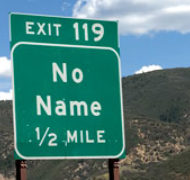Riddles
Blog / Produced by The High Calling
I enjoy solving, and telling, riddles while hiking with others. Like this one: “There are fifty-two bicycles and a dead man in a room. What happened?” Riddles take work to solve - the first time, at least. The second time is a snap and by the third, you know the answer before the riddler finishes the question.
What fascinates me is that no matter how many times you hear the same riddle, your brain still has to solve it. Eventually it may feel like you simply know the answer but that’s only because your solution speed has increased.
Words work like this. Every one of the thirteen words in this sentence is a mini riddle. For non-English speakers, they are impossible riddles; an indecipherable series of adjacent shapes devoid of meaning. But you and I solve them – and their combination which we call sentences – just as fast as our eyes can scan the page (or thumb through a language dictionary).
What we look for, in each and every riddle, is meaning. Without it, we’re lost. With the wrong meaning, we’re lost. But with meaning, we can move from one word to the next, one sentence to the next, until we find ourselves deep into the night zipping through Grisham or Rowling (Who zips through Dostoyevsky or Hugo past bedtime?) or perhaps composing our own riddles. Because words have meaning, they carry the power to shape our lives. Words sell products, evoke emotions, settle contracts, inform beliefs and generally shape history. In fact, we spend a great portion of our lives discerning and assigning word meaning.
Riddle makers
I suppose, then, that we could think of ourselves as riddle makers. We combine words and give them to another person or group of people to solve. Every time my 4th grader remembers the instructions (words) we gave her for crossing the street, she not only remembers how to stay safe (since words have meaning), but also that we value her (since word meanings have implications). Each street crossing presents the riddle and its solution in a faster and faster cycle, until the solution is so embedded that it becomes one of the truths she tells herself: “I value my life and my parents love me. I value my life and my parents love me.”
Speaking of traffic, even the GPS navigation lady expects us to solve riddles. “Take the next right onto Mulberry Street.”
Imagine not knowing what words meant or not being able to assign meaning to the people and ideas we care about. In his book, The Dangerous Act of Loving Your Neighbor, Mark Labberton says, “Being rightly named means being truly known.” What a gift it is to name. To be sure, it requires attentiveness and knowledge. We can’t make riddles for others haphazardly. Yet when we tell and show often enough - and rightly enough - those others eventually feel like they simply know the answer.
Of course, the converse is true. Labberton writes, “Everywhere injustice thrives, people are misnamed.” I’ve done my own share of misnaming. I rarely intend to inflict the kind of lasting pain word meaning can inflict, but I can’t deny my guilt. I hand out riddles in moments of anger and the hearer returns to them often enough that they eventually know that answer too.
We’re a word-doling, riddle-making bunch. From Adam to my mom, Shakespeare to Helen Keller, we love making meaning. The challenge is doing it well, helping each other wish again and again that it was the first time we’d heard the riddle.
Image by Giant Ginkgo. Used with permission via Flickr. Post by Sam Van Eman.





